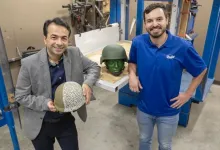(Press-News.org) To build upon a quarter-century of world-renowned research in zoonotic viral diseases, X.J. Meng has been rewarded with a prestigious National Institutes of Health (NIH) Method to Extend Research in Time (MERIT) Award – the first awarded to Virginia Tech.
“This is a huge honor and privilege,” said Meng, University Distinguished Professor of Molecular Virology in the Virginia-Maryland College of Veterinary Medicine and a member of the National Academy of Sciences. “It is really gratifying to know that the program officers and other officials at NIH thought that the body of a work we've been doing here in the veterinary college over the last 25 years deserves long-term, stable support. It’s a massive, huge honor.”
The MERIT Award, established in 1986, offers long-term funding to exceptional researchers who have demonstrated outstanding research competence and productivity and are highly likely to continue to perform in an outstanding manner. Researchers cannot apply directly for the award — potential recipients are identified by program officials for nomination and approved by the NIH Council.
The Meng Lab will receive about $2 million over the next five years with the opportunity to seek approval to renew without undergoing regular peer review for five subsequent years for up to $2.4 million, as the lab continues its cutting-edge research on hepatitis E virus.
Knowing more about hepatitis E
Meng will use the MERIT award to investigate how the hepatitis E virus causes diseases in liver and non-liver tissues, such as hepatitis E virus-associated neurological sequelae and chronic hepatitis, and severe adverse disease outcomes during pregnancy. The ultimate goals are to understand the fundamentals of the hepatitis E disease process and develop effective therapeutic countermeasures, including antiviral drugs and vaccines.
“This MERIT Award is also a recognition and reflection of many current and past members of my lab for their contributions to our research program,” said Meng. “I am also grateful for having many fantastic faculty collaborators over the years at Virginia Tech and beyond.”
Hepatitis E virus is an important but extremely understudied human pathogen, causing both acute and chronic hepatitis. In addition to humans, hepatitis E virus also infects more than a dozen other animal species and is a recognized zoonotic pathogen. According to the World Health Organization, approximately 20 million HEV infections occur each year, leading to more than 3.3 million cases of hepatitis and over 44,000 deaths annually.
One of about 15 nationally
The award is very selective, as only about 15 MERIT Awards are issued annually from the NIH’s National Institute of Allergy and Infectious Diseases, which has continuously funded Meng’s research for more than 24 years.
“X.J. Meng’s influential scholarship in applied virology is so very deserving of this rare and highly prestigious award,” said M. Daniel Givens, dean of the veterinary college. “His academic citizenship and consistent demonstration of scientific expertise unquestionably merit the NIH’s assessment of highest likelihood for continued performance of outstanding research activities.”
Meng’s recent NIH R01 grant applications have been scored well during peer review, scoring in the top 3 percentile in 2013 and top 4 percentile in 2019. His most recent NIH R01 grant in 2023 received a rare perfect score of 10 and scored in the top 1 percentile, which prompted a MERIT Award nomination by NIH officials.
This stable NIH funding will enable Meng, also a professor of internal medicine at the Virginia Tech Carilion School of Medicine, to focus more time and effort on research and less on seeking funding.
“This is important, as many scientists spend tremendous amounts of time on writing grant proposals and going through the peer review process,” said Meng, the founding director of the Center for Emerging, Zoonotic, and Arthropod-borne Pathogens at the Fralin Life Science Institute. “I can now focus more of my time on the actual research projects. I can help students and postdocs more in tackling the scientific problems instead of worrying about writing a grant proposal to go through a peer review process, knowing that we do have long-term support. That also frees me and my time to do some other things, such as serving my profession and the scientific community.”
Meng’s distinguished career
Meng serves as a member of the World Health Organization’s Prioritization Advisory Committee, chairing a subcommittee, as that organization prioritizes pathogens of epidemic and pandemic significance. He also serves on the Food and Agriculture Organization of the United Nations/World Health Organization Joint Expert Panel on Microbiological Risk Assessment of microorganisms in foods. Meng chairs the National Academy of Sciences’ Veterinary and Wildlife Sciences and Health Discipline, and serves on the Board of Directors of the Virginia Academy of Science, Engineering, and Medicine.
The Meng lab has developed commercial vaccines against emerging viruses. The team invented the first U.S. Department of Agriculture fully-licensed commercial vaccine against a deadly pig virus – porcine circovirus type 2. This commercial vaccine, first released in 2006, is still on the global market. As an inventor of more than 20 U.S. patents, Meng was elected a Fellow of the National Academy of Inventors in 2014.
Meng has received many other prestigious awards and honors, including being an elected Fellow of American Academy of Microbiology, an elected Fellow of American Association for the Advancement of Science, recipient of the 2017 State Council of Higher Education for Virginia (SCHEV) Outstanding Faculty Award, and recipient of the Virginia Tech Lifetime Achievement Award for Innovation in 2023. Meng currently serves as editor or editor-in-chief for four international journals.
After completing his Ph.D. in immunobiology at Iowa State University’s College of Veterinary Medicine, Meng worked in the NIH’s Laboratory of Infectious Diseases from 1995 to 1999, first as a John E. Fogarty Visiting Scientist, and then as a Senior Staff Fellow. Meng joined Virginia Tech in 1999 as an assistant professor in molecular biology in the veterinary college.
In addition to his extensive research and service in various national and international committees and organizations, Meng has held several leadership positions at Virginia Tech, including director of the DVM/Ph.D. dual degree graduate program; director of the NIH T32 Post-DVM training program; and interim executive director of the Fralin Life Science Institute.
END
X.J. Meng receives prestigious MERIT Award to study hepatitis E virus
2024-09-16
ELSE PRESS RELEASES FROM THIS DATE:
Wyss Institute team selected to develop first-of-its-kind biologically engineered broad-spectrum antimicrobial therapeutic under a contract from the DARPA-SHIELD program
2024-09-16
By Benjamin Boettner
(BOSTON) — Researchers at the Wyss Institute for Biologically Inspired Engineering at Harvard Universityreceived a contract for up to $12M from the Defense Advanced Research Projects Agency (DARPA)’s new SHIELD program. The SHIELD (Synthetic Hemo-technologies to Locate and Disinfect) program aims to develop a prophylactic treatment that can be broadly administered to trauma victims in combat casualty care scenarios to rapidly clear multiple bloodborne bacterial and fungal pathogens, limit morbidity and mortality, and protect recipients for up to seven days.
Blood ...
‘Food theft’ among seabirds could be transmission point for deadly avian flu
2024-09-16
The deadly H5N1 avian influenza virus, which has killed millions of birds worldwide since 2021 – and in rare cases can be transmitted to humans – may be spread through the food-stealing behaviour of some seabirds.
A study published today in the journal Conservation Letters highlights food theft – also known as ‘kleptoparasitism’, where some seabird species like frigatebirds and skuas force other birds to regurgitate their prey – as a possible transmission path for the spread of avian flu.
Led by scientists from UNSW Sydney’s ...
SwRI and UTSA developing helmet pads to reduce traumatic brain injury in military service members
2024-09-16
SAN ANTONIO — September 16, 2024 —Researchers from Southwest Research Institute (SwRI) and The University of Texas at San Antonio (UTSA) are creating innovative military helmet pads designed to prevent traumatic brain injury (TBI). The project, led by SwRI’s Dr. Daniel Portillo and UTSA’s Dr. Morteza Seidi, is supported by a $125,000 grant from the Connecting through Research Partnerships (Connect) program.
Traumatic brain injury can affect human performance and quality of life. It is ...
Waiting is the hardest part: Medical field should address uncertainty for cancer patients under active surveillance
2024-09-16
Indianapolis – Patients with low-risk cancers undergoing active surveillance face a favorable long-term prognosis. David Haggstrom, M.D., MAS, makes the case that it’s time for the medical field to help manage the anxiety caused by waiting.
Dr. Haggstrom, a physician-researcher with Regenstrief Institute, the Veterans Administration Medical Center in Indianapolis and the Indiana University School of Medicine, is lead author of a Viewpoint article, published in JAMA (Journal of the American Medical ...
New research reveals major gaps and new solutions in menopause care
2024-09-16
The Kinsey Institute at Indiana University, in partnership with leading sexual wellbeing company the Lovehoney Group and its Womanizer brand, has released early data from new nationally representative surveys exploring menopause knowledge, symptom management, medical care engagement, and health disparities among Americans.
Phase 1 surveyed of 1,500 American adults aged 18-88, to assess overall public knowledge and understanding of menopause. Phase 2 surveyed 1,500 women aged 40-65, to better understand women’s experiences with menopause. ...
Financial grants fuel well-being of K-12 students nationwide
2024-09-16
DALLAS, September 16, 2024 — As the new school year begins, the American Heart Association is supporting student health and well-being by awarding financial grants to nearly 80 elementary, middle and high schools nationwide. These grants, part of the Association’s commitment to improve cardiovascular health for all people everywhere, will allow local schools in communities across the country to invest in vital resources such as new fitness equipment, water filling stations and health education ...
New study reveals majority of pediatric long COVID patients develop a dizziness known as orthostatic intolerance
2024-09-16
BALTIMORE, September 16, 2024— A new study from Kennedy Krieger Institute shows that the majority of children diagnosed with long COVID are likely to experience orthostatic intolerance (OI), a condition that causes the body to struggle with regulating blood pressure and heart rate when standing up. As a result, children often feel dizzy, lightheaded, fatigued and may experience “brain fog” or cognitive difficulties.
Orthostatic intolerance includes disorders such as postural orthostatic tachycardia syndrome (POTS) and orthostatic hypotension. Among the patients studied, dizziness (67%), fatigue (25%), ...
Urgent conservation efforts needed: Small population size and possible extirpation of the threatened malagasy poison frog Mantella cowanii
2024-09-16
New research highlights the precarious status of one of Madagascar's most threatened amphibians, the harlequin mantella (Mantella cowanii), revealing small population sizes and the possible extirpation of the species from several of its historic habitats. The findings underscore the urgent need for targeted conservation action to prevent the species from slipping further towards extinction.
Research Findings: A Dire Situation
Amphibians around the world are facing unprecedented population declines, and Mantella cowanii is no exception. The study, which focused on confirming the frog’s presence at historic localities and estimating its population size ...
American Academy of Sleep Medicine Foundation and Restless Legs Syndrome Foundation co-fund RLS research
2024-09-16
The American Academy of Sleep Medicine Foundation has joined forces with the Restless Legs Syndrome Foundation to fund research leading to new treatments and a cure for RLS.
Earlier this year, the AASM Foundation began an agreement with the RLS Foundation to co-fund basic and clinical RLS research. The partnership for 2024 includes the following research priorities:
Neurobiological interaction: Elucidate the points of interaction between RLS-relevant neurotransmitters, neuronal pathways, and iron deficiency.
Pharmacologic treatments: Elucidate effects of novel pharmacological approaches on RLS.
Clinical practice: Research based on innovations in patient ...
Vital language sites in brain act like connectors in a social network
2024-09-16
Discovery expands understanding of how language is produced by the brain
Current method of mapping brain language function for surgery using electrical stimulation hasn’t changed in 50 years
Finding could make it easier on patients and doctors to identify critical language sites in the brain to preserve function after surgery
CHICAGO --- When surgeons perform brain surgery on people with brain tumors or epilepsy, they need to remove the tumor or abnormal tissue while preserving parts of the brain that control language and movement.
A new Northwestern Medicine study may better inform doctors’ ...




